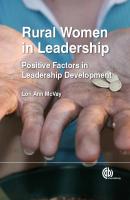Rural Women in Leadership. Lori Ann McVay
Чтение книги онлайн.

Читать онлайн книгу Rural Women in Leadership - Lori Ann McVay страница
Название: Rural Women in Leadership
Автор: Lori Ann McVay
Издательство: Ingram
Жанр: ВЭД
isbn: 9781789244489
isbn:
Rural Women in Leadership
Positive Factors in Leadership Development
I owe an immense debt of gratitude and love to my husband, Jeff McVay, and our son, Jack, for their patience and support during the writing process.
Rural Women in Leadership
Positive Factors in Leadership Development
Lori Ann McVay, PhD
CABI is a trading name of CAB International
| CABI | CABI |
| Nosworthy Way | 38 Chauncey Street |
| Wallingford | Suite 1002 |
| Oxfordshire OX10 8DE | Boston, MA 02111 |
| UK | USA |
| Tel: +44 (0)1491 832111 | T: +1 800 552 3083 (toll free) |
| Fax: +44 (0)1491 833508 | T: +1 (0)617 395 4051 |
| E-mail: [email protected] | E-mail: [email protected] |
| Website: www.cabi.org |
© L.A. McVay 2013. All rights reserved. No part of this publication may be reproduced in any form or by any means, electronically, mechanically, by photocopying, recording or otherwise, without the prior permission of the copyright owners.
A catalogue record for this book is available from the British Library, London, UK.
Library of Congress Cataloging-in-Publication Data
McVay, Lori Ann.
Rural women in leadership : positive factors in leadership development / Lori Ann McVay.
p. cm.
Includes bibliographical references and index.
ISBN 978-1-78064-160-7 (alk. paper)
1. Women in rural development. 2. Rural women--Social conditions. 3. Leadership.
I. Title.
HQ1240.M3594 2013
307.1'412082--dc23
2013016573
ISBN-13: 978 1 78064 160 7
Commissioning editor: Claire Parfitt
Editorial assistant: Alexandra Lainsbury
Production editor: Tracy Head
Typeset by AMA DataSet Ltd, Preston, UK
Printed and bound in the UK by CPI Group (UK) Ltd, Croydon, CR0 4YY
Contents
1 Situating the Study: A Review of Relevant Literature
2 Introducing the Methodology and Participants
3 Setting a Baseline: Case Studies
4 Listening Closely: External, Internal and Key Factors
Introduction
In April 2010, the European Forum on Women in the Sustainable Development of the Rural World put forth its recommendation for ‘Promoting gender equality and the participation of women in the decision making bodies of key organizations in the elaboration, management and monitoring of rural development policies’ (European Forum: The Role of Women in Sustainable Development of the Rural Environment, 2010). Five months later, a paper presented to the European Parliament in Brussels further highlighted recent focus on rural women as illustrated by the European Commission’s concern with gender equality in developing the 2000–2006 and 2007–2013 Common Agricultural Policy (Bock, 2010b). This European context, rich with possibilities for the advancement of rural women, provided an ideal milieu for research into their leadership development.
Northern Ireland – with its vibrant rural communities and dynamic network of rural women’s groups – supplied a rich localized site for this study. The six Rural Women’s Networks in Northern Ireland – and an umbrella organization, the Northern Ireland Rural Women’s Network (NIRWN) – provided a natural starting point for identifying participants, as their directors and other staff members fit well within the profile of rural women in leadership. And though not all rural women in the region are involved with the Rural Women’s Networks, the networks actively promote the advancement of Northern Ireland’s rural women at local, regional and national levels. This promotion is greatly needed, given the continued presence of gender inequalities and inadequacies in the areas of child-care, transportation, employment opportunities and training (Shortall, 2003; Rural Women’s Networks, Northern Ireland Rural Women’s Network, 2007). The networks, along with Northern Ireland’s Department of Agriculture and Rural Development (DARD), have called for leadership development in rural areas as a crucial means of addressing these and other pressing issues. This study was therefore undertaken as a means of ascertaining the key factors facilitating the development and acquisition of leadership skills among women leaders from rural areas of Northern Ireland. Two secondary questions guided the research design. First, what people, organizations and/or events supported these women’s development and acquisition of leadership skills? And, secondly, what thought processes and choices did they exercise in order to overcome obstacles in their development as leaders? As a matter of situating the study within СКАЧАТЬ